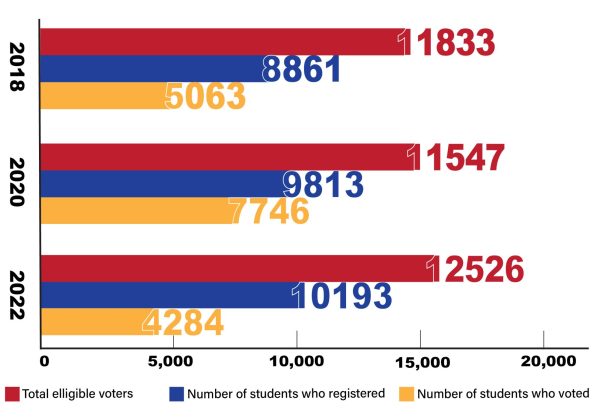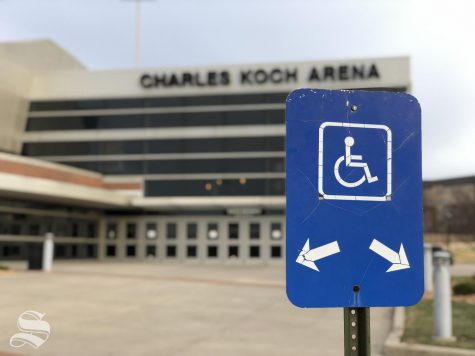Students and WSU police reflect on campus safety
Junior Denae Sawyer walks past the Flats and Suits to clear her mind on Sept. 27. Sawyer frequently walks around campus feeling safe due to the officers on campus and the Guardian App.
Wichita State was ranked the 16th safest university in 2020 at the National Campus Safety Summit out of 2500 institutions. Guy Schroeder, Wichita State University Police Department (WSUPD) police chief, hopes to make the top 10 for 2021.
Schroeder said that the WSUPD has a good working relationship with the Wichita Police Department (WPD) and is willing to help each other out as needed. In his nine years as police chief, he said that WPD has not had to come to the assistance of the WSUPD, except maybe once or twice.
“That means we obviously are doing something within the parameters that we need to be doing to keep the kids safe,” Schroeder said.
There are 42 blue lights – which give anyone on campus the ability to hit a button for almost immediate help – located across campus. They all have 360 cameras.
As an urban university located in an area with higher crime rates, Schroeder said that he has not seen any safety issues that involve people outside the university.
“If you look at the WPD website, you’ll see that there are issues in the neighborhood, obviously,” Schroeder said. “But we don’t have that. It doesn’t permeate the campus. I think a lot of it has to do with having three or four parked cars on a mile square, rolling all the time.”
Denae Sawyer, a junior majoring in honors baccalaureate, lives on campus and enjoys taking walks in the evening before the sun sets. She usually takes pepper spray and a 1-inch pocket knife with her.
Wichita.edu dives into what type of weapons regarding safety are allowed on campus.
Sawyer said that she would recommend the RAVE app “until the day she dies.” The app provides safety resources to students. It allows Sawyer to do a check-in when she reaches her destination with the police and her emergency contacts.
She also likes the discrete option of texting the police. Last year, she believed a suspicious character was following her and was able to flag down a police car driving by within seconds.
Sawyer said that she sticks to the major roads around campus because she knows they are being monitored. She knows where all the blue lights are and keeps one headphone in.
Schroeder said the WSUPD spends a lot of time monitoring parking lots with a large number of cars to try and eliminate criminal activity. The west side of campus is where they spend most of their time because this is where most people congregate.
“If you think [someone’s] activity is suspicious, call,” Schroeder said. “If it’s a false call, it’s a false call. I love false calls. I’d much rather it be a false call than be something that turns into something that we need to be concerned about.”
Toni Bryant, a junior majoring in entrepreneurship, said that after a student reported being raped at Shocker Hall it decreased her trust in the campus police due to their limited response.
A protest followed the sexual assault incident, calling for further transparency and investigation.
“I want someone to take me seriously,” Bryant said. “Evidence can help but like, to be believed just the first time, there’s something very powerful in being believed.”
Bryant said she carries pepper spray with her on campus.
The chief is also in contact with the police chief of every Kansas Board of Regent (KBOR) university, as well as Friends University and Newman University, to discuss issues. He has also been working hard on his partnerships across campus.
The city of Wichita has a FLOCK system, which is a license plate reader system, at 21st and Hillside, 21st and Oliver, and will soon have them at 17th and Oliver and 17th and Hillside. The WSUPD has been able to use it to identify crime-affiliated vehicles.
Schroeder encourages students to pay attention to their surroundings. To prevent theft, personal items should be secured to your body. Locking cars and hiding valuables prevent theft.
When walking on campus, students should consider walking in groups when possible and using the RAVE app when alone. The WSUPD has no issue with escorting a student where they need to go.
“We want to be a part of campus and not the security on campus,” Schroeder said. “I want people to be comfortable with us being there, but also want, if we’re running into a building, I want them running out and going somewhere else.”

Julia Nightengale was a third-year reporter for The Sunflower, previously working as a Copy Editor and News Editor. Nightengale is a graduate student working...












